3 March 1242 Confiscation and burning of the Talmud in Paris at instigation of Nicholas Donin
Around 1236, shortly after his conversion to Roman Catholicism, Nicholas Donin of La Rochelle, pressed charges against the Talmud to Pope Gregory IX. According to Donin, the Talmud claims greater authority than the Bible, it blasphemes against God, Jesus and Mary, and contains laws and stories that are outrageous and plainly stupid.
In 1225, had been Donin was excommunicated from the ghetto of Paris by Rabbi Yechiel of Paris in the presence of the whole community and with the usual ceremonies. Having for ten years lived in the state of excommunication, though still clinging to Judaism, he was baptised into the Catholic Church and joined the Franciscan Order. Some say, however, that he converted well before meeting Rabbi Yechiel of Paris.
From Zonca 167: Throughout his life, Nicholas Donin made several unsuccessful attempts to incite Christian officials against his former coreligionists. Donin‘s calculated goading was characterized by a flair for novelty. In the wake of four blood libels in 1235, Frederick II investigated the accusations leveled against the Jews, which included statements from a number of converts from across northwestern Europe. We can positively identify only one former Jew: Nicholas Donin. He said that Jews require human sacrifice and blood in their Passover rituals, an unprecedented accusation. His accusations stirred up some Crusaders to the bloody persecutions in Brittany, Poitou, and Anjou, in which 3,000 Jews were killed, 500 accepting the alternative of baptism.
Donin broke new ground in anti-Jewish polemic when he chose to focus his attacks on the Talmud. His allegations fall into four broad claims:
- The Talmud is an autonomous body of literature;
- The Talmud contains anti-Christian, anti-social, passages;
- The Talmud directly attacks Christian beliefs; and
- The Talmud contains anthropomorphic passages mocking the Incarnation and transubstantiation.
In June 1239, the pope issued a bull calling all Christian rulers to inspect Jewish writings on the first Sabbath of Lent 1240. His call fell on deaf ears everywhere except Paris, where King Louis IX, directly influenced by Nicholas, who delivered the bull in person, confiscated rabbinic texts and summoned leading French rabbis to defend the Talmud against charges brought up by Donin.
This order was generally ignored, except in France, where the Jews were compelled under pain of death to surrender their Talmuds (March, 1240). Louis IX ordered four of the most distinguished rabbis of France — Yechiel of Paris, Moses of Coucy, Judah of Melun, and Samuel ben Solomon of Château-Thierry—to answer Donin in a public debate. In vain, however, did the rabbis argue against the charges of blasphemy and immorality which were the main points of Donin’s arraignment. The commission condemned the Talmud to be burned. On June 6, 1242, fire was set accordingly to twenty-four carriage loads (ten to twelve-thousand volumes) of written works.
Prayer: Lord, it is with great shame and sorrow that we remember this day. As Jewish believers we have often been accused of being disloyal to our people Israel by believing in Yeshua, and here is a terrible example of someone turning against their own people. That Nicolas Donin was used by others goes without saying, as the medieval church sought to impose sanctions on those who referred to any other ‘sacred text’ or interpret it without the authority of ecclesiastical power. That he was caught up in the anti-Judaism of his day does not excuse his own complicity and misplaced zeal. Have mercy, Lord, have mercy, and may we as Jewish believers in Yeshua today give not cause for such a charge, but rather be seen as faithful servants of yours and of your people Israel. In our Messiah’s name we pray. Amen.
http://www.jewishvirtuallibrary.org/jsource/anti-semitism/TalmudBurning.html
http://en.wikipedia.org/wiki/Disputation_of_Paris
http://en.wikipedia.org/wiki/Nicholas_Donin
https://www.youtube.com/watch?v=R_pnL6D2iJs
Reading Medieval Religious Disputation: The 1240 “debate” Between Rabbi Yehiel of Paris and Friar Nicholas Donin by Saadia R. Eisenberg
http://deepblue.lib.umich.edu/bitstream/handle/2027.42/60741/seisenbe_2.pdf?sequence=2
Milan Žonca: Apostasy and Authority: The Transformation of Christian Anti-Jewish Polemic in the Twelfth and Thirteenth Centuries.
Isidore Loeb Latin edition in French
http://www.rachelnet.net/media/aiu/livres/FR_AIU_L_J9529C.pdf
By Saadia R. Eisenberg – PhD Dissertation, University of Michigan, 2008
Abstract: This dissertation takes as its subject the Latin and Hebrew accounts of a much-studied event: the Jewish-Christian Disputation of 1240. In medieval Europe’s first formal religious debate, Friar Nicholas Donin challenged Rabbi Yeḥiel of Paris over the legitimacy of the Talmud. After the disputation, Donin and Yeḥiel wrote individual accounts of their experiences. This dissertation concentrates on the texts of the two disputants and suggests a new approach to reading these texts. Based on the records of the 1240 Debate, this dissertation demonstrates that the authors’ goals in writing polemic were not necessarily or exclusively to offer a response to their antagonists. Read as a historical narrative, Yeḥiel’s document reveals that it is less an account of the debate than a manual for future Jewish disputants. Moreover, because Yeḥiel’s intended audience consisted of learned Jews, he was able to write in melitza, a pastiche of biblical verses in rhymed prose which is impenetrable to the uninitiated. Both explicitly and subtextually, Yeḥiel provided words of encouragement to his readers, as well as subtle anti-Christian invective. Donin’s Latin record addressed a Christian, clerical audience, as this was the population with both the ability and the interest in reading such literature. As such, Donin’s account must be understood as addressing ecclesiastical concerns, notably the development of unmonitored texts. In an increasingly text-oriented environment, unmonitored texts such as the Talmud were feared as potential catalysts for heretical or offensive ideas. This dissertation places the debate in a Christian context of increasingly tight systems of religious control over books. This dissertation concludes with a comparison of cultural developments in the Jewish and Christian world such as the rise of textual communities, questions of anthropomorphism, heresy, and the structure of academic institutions. Through cognizance of the milieu and audiences of the authors, both Jewish and Christian, we can come to a more nuanced understanding of religious, cultural, and intellectual currents of thirteenth-century northern France.

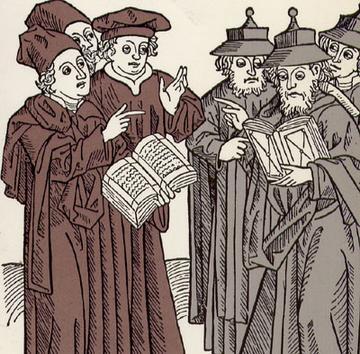
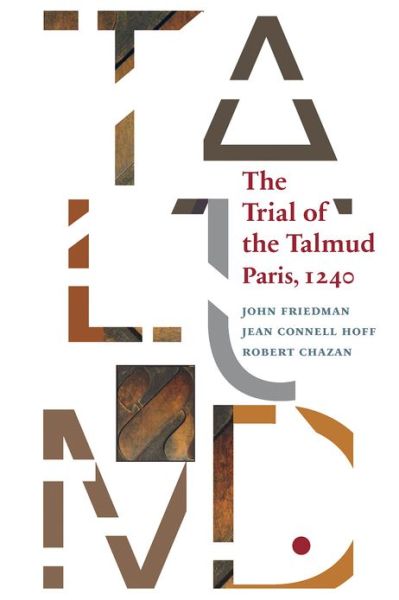
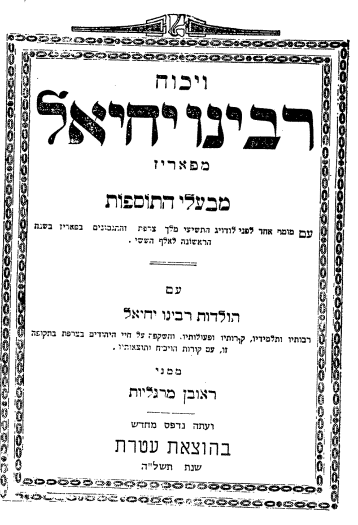
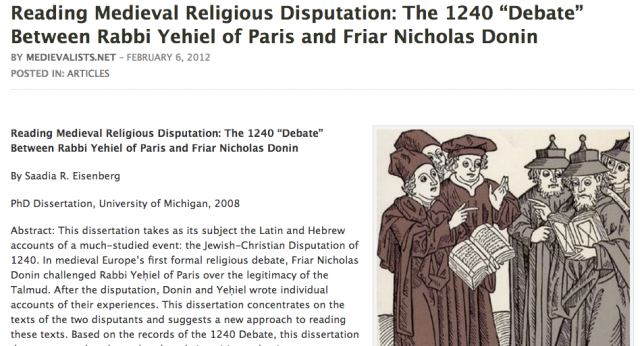
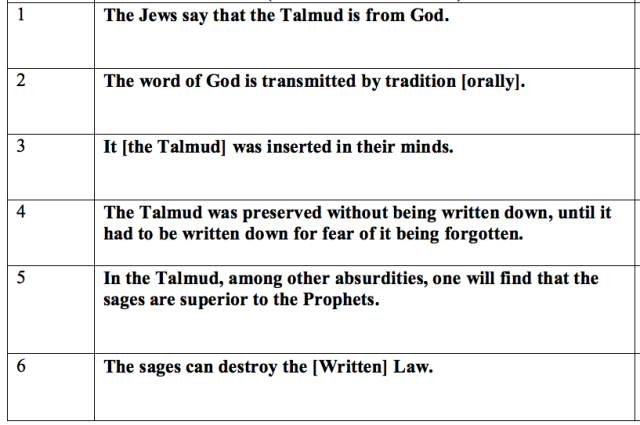









Reblogged this on Talmidimblogging.
LikeLike
Another unfortunate mark in the history of the church
LikeLike
Pingback: 3 March 1240 Talmud burnt in Paris #otdimjh - Mapping Messianic Jewish Theology